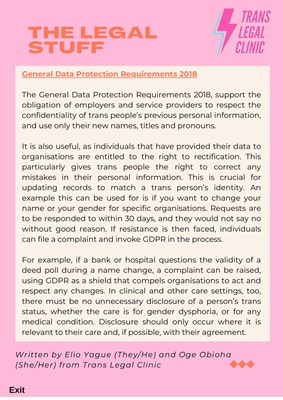
THE LEGAL
STUFF
General Data Protection Requirements 2018
The General Data Protection Requirements 2018, support the
obligation of employers and service providers to respect the
confidentiality of trans people's previous personal information,
and use only their new names, titles and pronouns.
It is also useful, as individuals that have provided their data to
organisations are entitled to the right to rectification. This
particularly gives trans people the right to correct any
mistakes in their personal information. This is crucial for
updating records to match a trans person's identity. An
example this can be used for is if you want to change your
name or your gender for specific organisations. Requests are
to be responded to within 30 days, and they would not say no
without good reason. If resistance is then faced, individuals
can file a complaint and invoke GDPR in the process.
For example, if a bank or hospital questions the validity of a
deed poll during a name change, a complaint can be raised,
using GDPR as a shield that compels organisations to act and
respect any changes. In clinical and other care settings, too,
there must be no unnecessary disclosure of a person's trans
status, whether the care is for gender dysphoria, or for any
medical condition. Disclosure should only occur where it is
relevant to their care and, if possible, with their agreement.
Written by Elio Yague (They/He) and Oge Obioha
(She/Her) from Trans Legal Clinic